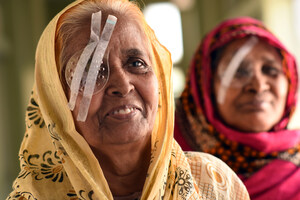Orbis Celebrates New Data Showing a 91% Reduction in Populations at Risk of Blinding Trachoma in Endemic Areas
Orbis applauds collaboration, vows to step up efforts in Ethiopia to eradicate disease
NEW YORK, Aug. 20, 2019 /PRNewswire/ -- Orbis International commends progress towards eliminating trachoma as the World Health Organization (WHO) announced new data. The report was released at the annual meeting of the WHO Alliance for the Global Elimination of Trachoma by 2020 (GET 2020) earlier this year; it stated that the number of people at risk for trachoma had fallen from 1.5 billion in 2002 to 142 million in 2019 - an incredible 91% reduction.
Trachoma, the world's leading cause of infectious blindness, was eradicated in most industrialized nations by the 1950s but is still found in areas of the world where poor sanitation, lack of clean water and limited access to healthcare services are common. Due to traditional gender roles, women caring for young children are four times as likely to develop advanced trachoma, and become blinded as men.i,ii,iii
The goal of eliminating trachoma cannot be accomplished alone; it will require strong organizational partnerships and ongoing funding. The four leading eye health organizations: Orbis, SightSavers, Fred Hollows Foundation, and CBM, have seen the urgency of blinding trachoma and agreed to tackle this issue together. Each organization has focused their efforts in a specific region of Ethiopia in the hopes of reaching as many communities as possible. Ethiopia has been a target region for these organizations as 44% of the global cases of trachoma found in the region and more than 75 million people in the country live in areas where trachoma is endemic.
Orbis International, one of the leading non-profits fighting trachoma, has played a key role in this reduction. In 2018 alone, Orbis distributed over 8.3 million doses of Zithromax and Tetracycline, antibiotics used to prevent and treat Trachoma. Orbis also completed 16,474 trachomatous trichiasis (TT) surgeries in 2018. Recent progress has been backed up with a long history of work in preventing and treating trachoma through 20 years of partnership with local hospitals in Ethiopia.
"We are thrilled to learn that the number of people living in areas endemic for trachoma has decreased by 91% since 2002 thanks to the enormous, collaborative efforts of partners who have helped make this possible," said Dr. Danny Haddad, Chief of Programs at Orbis International. "We are determined to step up our efforts in Ethiopia, doing our part to free the SNNPR region of this blinding scourge, and aim to reach over 10 million people this year alone. With 142 million people still at risk from trachoma globally, we must continue to innovate and collaborate with the eye health community to finally consign this painful and blinding disease to the history bin."
Orbis International is committed to working with partners across the eye health community to continue to make strides in eliminating this blinding disease from Ethiopia.
About Orbis International
Orbis is a leading global non-governmental organization that has been a pioneer in the prevention and treatment of blindness for over 30 years. Orbis transforms lives by delivering the skills, resources and knowledge needed to deliver accessible quality eye care. Working in collaboration with local partners including hospitals, universities, government agencies and ministries of health, Orbis provides hands-on ophthalmology training, strengthens healthcare infrastructure and advocates for the prioritization of eye health on public health agendas. Orbis operates the world's only Flying Eye Hospital, a fully accredited ophthalmic teaching hospital on board an MD-10 aircraft. To learn more, please visit orbis.org.
Media Contact:
Louise Harris
Chief, Global Marketing and Communications
[email protected]
i Trachoma – A women and children's health issue. Last access on 7/25/19 at http://www.trachomacoalition.org/sites/all/themes/report-2016/PDF/Trachoma_A_women_and_children's_health_issue.pdf
ii Women and Trachoma. The Carter Center. Last accessed on 7/25/19 at https://www.cartercenter.org/resources/pdfs/health/trachoma/women_trachoma.pdf
iii Trachoma. WHO. Last accessed on 7/25/19 at https://www.who.int/news-room/fact-sheets/detail/trachoma
SOURCE Orbis International

Related Links
WANT YOUR COMPANY'S NEWS FEATURED ON PRNEWSWIRE.COM?
Newsrooms &
Influencers
Digital Media
Outlets
Journalists
Opted In





Share this article